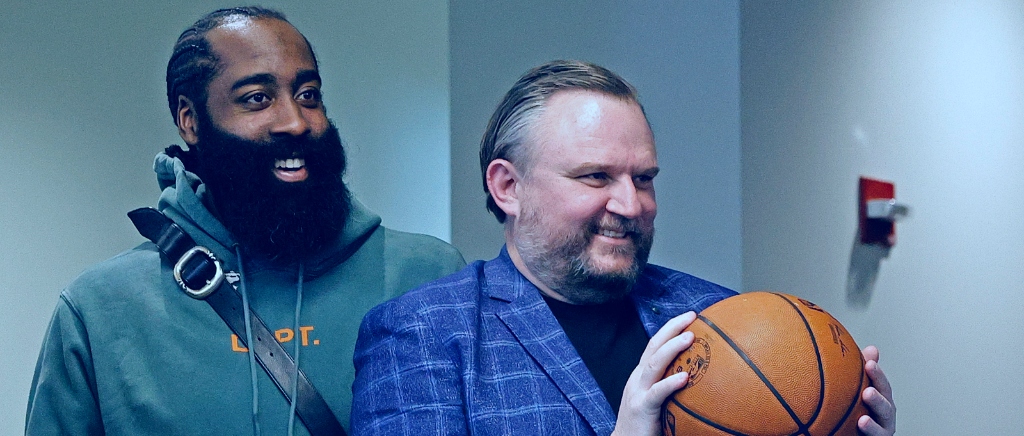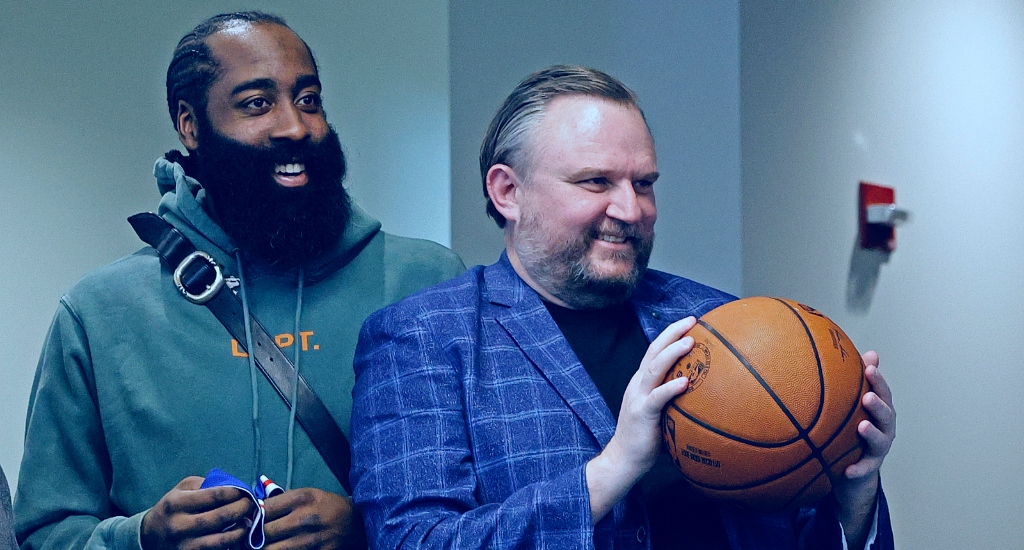
For eight years in Houston, James Harden and Daryl Morey made for a near-perfect match as a player-GM pairing. We don’t often think about that specific dynamic in sports, typically talking about how a player meshes with their coach more than a general manager, but, particularly in basketball, having a star who fits the ethos of the head of basketball operations makes the team-building process much easier.
Harden’s abilities aligned incredibly well with Morey’s obsession with efficiency. He was the poster child of modern basketball scoring, almost completely eschewing the midrange to attack the rim or shoot threes, setting the tone for a Rockets team that would do the same as a whole. The pair found a great deal of success in Houston, with Harden hoisting MVP trophies and scoring titles, while the team was a perennial contender in the West, albeit one that constantly fell short of the ultimate prize. That inability to reach the NBA’s summit ultimately led to Morey’s departure from the franchise after The Bubble, with Harden not far behind in demanding a trade to Brooklyn.
Two years later they would reunite, with Harden forcing his way to Philadelphia in hopes that he and Joel Embiid could do what he and Chris Paul (and Russell Westbrook) could not in Houston. However, early on he was not the same James Harden, lacking the same burst he once possessed as he battled hamstring issues. The result was another second-round exit for the Sixers, but one that at least came with some hope that a fully healthy Harden would raise their ceiling.
That summer, Harden and Morey concocted a plan to bring in a couple of old friends from Houston, with Harden taking a pay cut so they’d have the money to add PJ Tucker and Danuel House Jr., hoping to inject a bit more toughness into the Sixers roster. Harden hoped he’d become a Philadelphia sports legend with that act of selflessness, growing frustrated when he wasn’t given the credit he felt he deserved for knocking $15 million off of his deal to improve the team as a whole. That was the first tangible sign this could all go very wrong.
Harden expected something in return for his financial sacrifice. The problem was he was asking that of a team president who is notorious for not caring much about interpersonal relationships when it comes to negotiations. Given how close he was to Harden and how they’d partnered so well for a decade, many — clearly including Harden — thought even the cold, analytical nature of Morey wouldn’t look to squeeze his old friend on their next negotiation. And yet, we have years of evidence showing that when it comes to team-building, the human element rarely comes into play for the former Executive of the Year. And Harden, presumably, knew that.
That has long been considered Morey’s Achilles heel as the leader of a front office. He has thrown together combustible star combinations, showing little regard for the concept of team chemistry and believing that complementary skillsets matter far more than complementary personalities. He has frustrated agents and players in the past, rarely willing to reward past production on a future contract. And therein lay the problem facing Harden this summer. He was expecting to make up what he’d given up on the next deal with someone who handed out deals based on current and future value, hoping their longtime partnership would soften his stance.
The cracks in the foundation started showing as early as Christmas, when Adrian Wojnarowski first reported that Harden was seriously considering a return to Houston this summer. Those reports continued for six months, an effort to push Morey to put the long-term deal that James wanted on the table. However, after yet another second-round exit (where it should be noted Harden was great in two of the team’s wins against Boston) and it became clear the Rockets were moving in a different direction, Harden lost his leverage and Morey was not willing to budge on giving Harden the long-term max deal he was seeking.
Ultimately, we have reached the ending we all should’ve seen coming to this saga. We had a player wanting to be rewarded for his loyalty — after showing he was willing to issue two trade demands in successive years — from a front office led by a man who never rewarded anything but production and projections.
Now, each is trying to apply pressure in the only way they know how. Harden picked up his option and demanded a trade, with the Clippers as his only preferred destination. Morey is dipping back into the same playbook he used with Ben Simmons, looking to drag things into camp and beyond by insisting he won’t trade Harden for a package that doesn’t keep the Sixers in the title contender realm. Harden, for his part, is making it clear he’s got plenty in his bag of tricks to make life miserable for Morey and the Sixers if they don’t trade him, starting by torching Morey publicly on his tour of China.
They were once the ideal pairing of GM and star, but they were also destined for this kind of ending if external forces didn’t intervene. Both men are who they are, for better or worse. Harden, a 33-year-old star who still sees himself as the player he once was, deserving of a full max contract. Morey, a team president incapable of overlooking the signs of decline and potential red flags, even for the player he’s been closest with.
As a result, their relationship is seemingly irreparably fractured, with Harden pledging to never play for a team led by Morey again and Morey, fittingly, being “unmoved” by it all. We shouldn’t be surprised it came to this, but it doesn’t make it any less awkward to watch it play out.
Source: https://uproxx.com/dimemag/james-harden-daryl-morey-philadelphia-76ers-messy-ending-trade-request/
